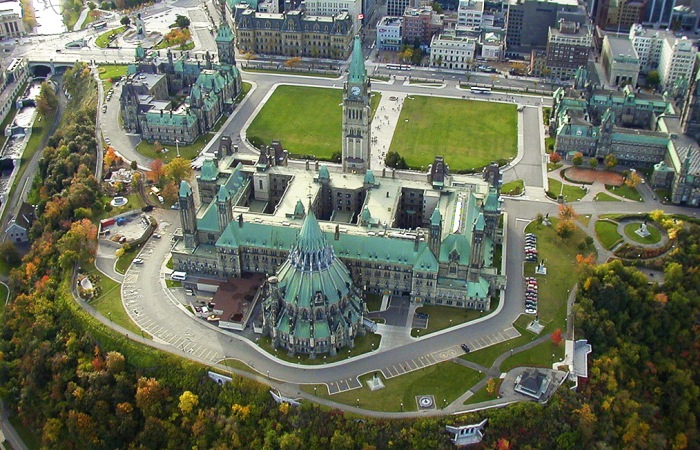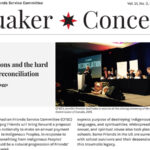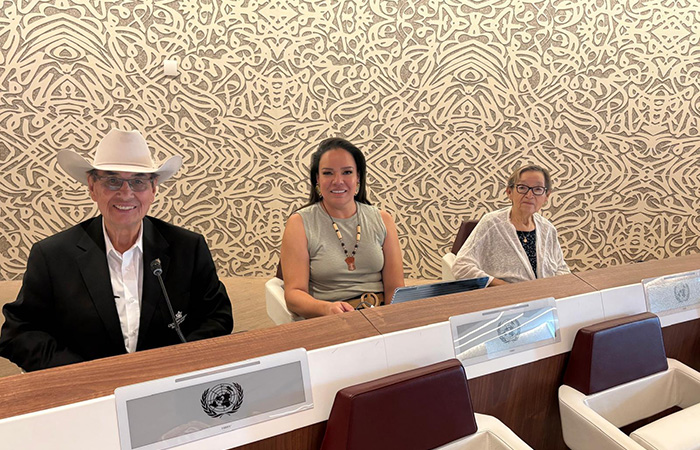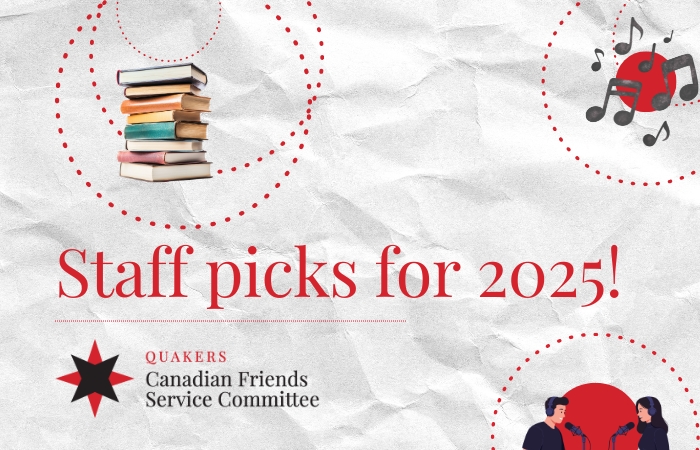
Open letter to the Prime Minister after his election win
June 19, 2025
Quaker Concern newsletter, summer 2025 edition
July 21, 2025![]() CFSC is in Geneva this week for the 18th session of the Expert Mechanism on the Rights of Indigenous Peoples. One of the important pieces of this work is supporting partners in the Coalition for the Human Rights of Indigenous Peoples. Below are the two statements the Coalition has made.
CFSC is in Geneva this week for the 18th session of the Expert Mechanism on the Rights of Indigenous Peoples. One of the important pieces of this work is supporting partners in the Coalition for the Human Rights of Indigenous Peoples. Below are the two statements the Coalition has made.

Agenda Item 6: Country engagement
Monday 14 July, 2025
Joint Statement from the Coalition for the Human Rights of Indigenous Peoples, Canada including:
Laurie Buffalo, Grand Chief Edward John, Cheryl Knockwood, Chief Wilton Littlechild, Kirby Muldoe, Lea Nicholas-MacKenzie
Assembly of First Nations, British Columbia Treaty Commission, Canadian Friends Service Committee, Giganawenimaanig (We All Take Care of Them), Ermineskin Cree Nation, Grand Council of the Crees (Eeyou Istchee) / Cree Nation Government, Indigenous World Association, National Family and Survivors Circle Inc., Samson Cree Nation, Tl’azt’en Nation (Canada), Tsilhqot’in National Government, Union of British Columbia Indian Chiefs, WIN Sports International
We are pleased to present the following Joint Statement on behalf of a number of Indigenous Nations and organizations, civil society organizations, and individual advocates who work together as part of a human rights network in Canada.
The Coalition for the Human Rights of Indigenous Peoples welcomes the Expert Mechanism’s Technical Advisory Note on its Country Engagement to Norway.
In our experience, this analysis is relevant to many other states, including Canada.
Therefore, the Coalition presents three recommendations for the EMRIP to call on all states to:
1) Adopt national implementation legislation setting out clear and explicit commitments to fully implement the UN Declaration on the Rights of Indigenous Peoples in law, regulation, and policy, similar to the national legislation adopted in Canada in 2021.
2) Work in consultation and cooperation with Indigenous Peoples to develop and carry out ongoing training on the Declaration for civil servants and to make such training available to other state mechanisms including officers of the court.
3) Establish competent, independent Tribunals for adjudication and redress for disputes related to Declaration implementation, consistent with Articles 8, 27, and 40.
The Advisory Notes sets out a careful analysis of the gap between the Government of Norway’s public commitments to uphold the UN Declaration on the Rights of Indigenous Peoples and the state’s unfortunate failure to effectively ensure free, prior and informed consent in law and practice.
The Expert Mechanism notes that the combined term “consult and cooperate”, used repeatedly in the Declaration, clearly recognizes a minimum requirement that is much more than mere consultation.
All states should work in consultation and cooperation with Indigenous Peoples to establish mutually agreed decision-making processes. Consistent with Article 37, any agreements reached with Indigenous Peoples, including existing Treaties, should be respected and enforced. Consistent with Articles 8, 27 and 40, states must establish effective and independent dispute resolution mechanisms, in consultation and cooperation with Indigenous Peoples, that are empowered to give due consideration to the Indigenous Peoples’ own legal traditions. If decisions are made without free, prior and informed consent, Indigenous Peoples’ right to access to justice must include access to mechanisms with the power to review and potentially revoke these decisions, and provide effective compensation.
The Expert Mechanism’s technical advice to the Government of Norway helpfully notes that free, prior, and informed consent is a necessary element of the foundational right to self-determination. The right to self-determination is affirmed in Article 3 of the UN Declaration and elaborated throughout the Declaration in Articles cited by the Expert Mechanism such as Article 18 (“the right to participate in decision-making in matters which would affect their rights, through representatives chosen by themselves in accordance with their own procedures…”) and Article 23 (“the right to determine and develop priorities and strategies for exercising their right to development”).
Respecting and upholding Indigenous Peoples’ right to self-determination requires states to recognize and collaborate with Indigenous Peoples as distinct orders of government with their own legitimate decision-making authority – including in areas where the states have long exercised exclusive jurisdiction. To carry out such a fundamental change in the relationship between states and Indigenous Peoples, there must be clarity and accountability on the responsibility to uphold the Declaration in all decisions undertaken by the state.
Agenda Item 9: Enhancing the participation of Indigenous Peoples in the United Nations
Wednesday 16 July, 2025
Joint Statement from the Coalition for the Human Rights of Indigenous Peoples, Canada including:
Laurie Buffalo, Grand Chief Edward John, Cheryl Knockwood, Chief Wilton Littlechild, Kirby Muldoe, Lea Nicholas-MacKenzie
Assembly of First Nations, British Columbia Treaty Commission, Canadian Friends Service Committee, Giganawenimaanig (We All Take Care of Them), Ermineskin Cree Nation, Grand Council of the Crees (Eeyou Istchee) / Cree Nation Government, Indigenous World Association, Metis National Council, National Family and Survivors Circle Inc., Samson Cree Nation, Tl’azt’en Nation (Canada), Tsilhqot’in National Government, Union of British Columbia Indian Chiefs, WIN Sports International
We are pleased to present the following Joint Statement on behalf of a number of Indigenous Nations and organizations, as well as human rights organizations in Canada.
The Coalition for the Human Rights of Indigenous Peoples welcomes and supports the process for enhancing the participation of Indigenous Peoples in the Human Rights Council. We would like to thank the co-facilitators for their report on the outcomes of the two intersessional meetings.
Further, we’d like to highlight and underscore two of the recommendations to the EMRIP:
- Paragraph 76 states that the establishment of a new accreditation status must be granted to Indigenous Peoples as collectives, not as individuals. The collective right to self-determination is a right enjoyed only by peoples, and not organizations or other groups. The enhanced participation process must continue to reaffirm this.
- Paragraph 72 of the intersessional meetings report underscores this recognition and emphasizes the distinction of Indigenous Peoples from NGOs. As collectives who hold the right to self-determination, Indigenous Peoples must have a status that recognizes they are peoples. Since time immemorial, Indigenous Peoples have exercised their own governance, created their own laws, and stewarded their own territory.
To be clear, Indigenous Peoples, Tribes, and Nations around the world have robust civil societies that play an important role. However, it is important to recognize that NGOs and civil society groups already have the ability to participate in their own right, yet those who hold the right to self-determination – Indigenous Peoples through their representative institutions, do not.
Paragraph 81 recommends the creation of a new, independent accreditation mechanism to determine the eligibility of Indigenous Peoples, Tribes, and Nations for the new, separate accreditation status. This new mechanism must be led by Indigenous Peoples from each of the seven socio-cultural regions. It must also be adequately funded and include a well-staffed secretariat. This funding is crucial to effectively enhancing the participation of Indigenous Peoples in the Human Rights Council.
Enhanced participation of Indigenous Peoples in the Human Rights Council stems directly from Article 3 of the UN Declaration on the Rights of Indigenous Peoples that affirms Indigenous Peoples’ right to self-determination. This article was hard fought by several Indigenous Peoples’ human rights advocates including EMIRP member Dalee Sambo Dorough. Self-determination is a right guaranteed to all peoples. Article 3 follows Articles 1 and 2 which articulate that Indigenous Peoples are free and equal to all other peoples and are subjects of international law. While this has always been true, historically, it has not always been recognized in the United Nations or in UN member states. Enhanced participation is a part of correcting the historic lack of recognition.
Enhanced participation through the creation of a new accreditation status for representative institutions of Indigenous Peoples would be a significant and long overdue achievement. A commitment to self-determination must therefore include both a centering of it as a principle in accreditation and sufficient funding to make accreditation possible. To follow through on an accreditation process without sufficient commitment of funds and human resources would be unacceptable.
Learn more about the human rights of Indigenous Peoples.




